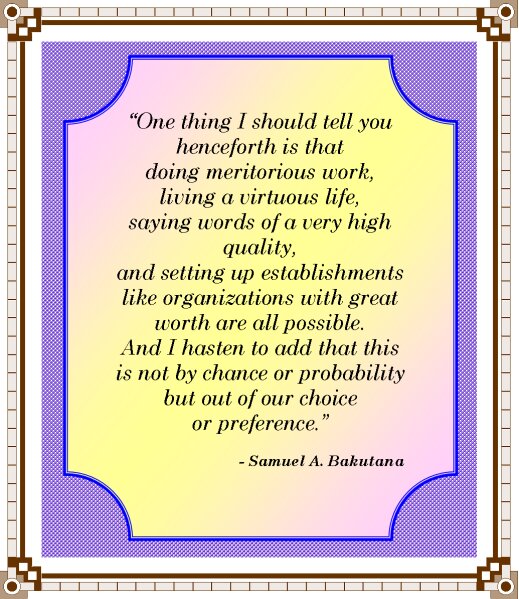Understanding Excellence in Leadership
One of the most liberating triumphs of all time is when one realizes that excellence is not a reserve for a few people somewhere out there. Knowing that it is necessarily not a privilege for those born from wealthy families is one of the most sobering truths. Getting aware that excellence is essentially not for the academic giants of
this world sends you thinking twice. Waking up to the fact that excellence is not luck that fate throws into your hands makes you reconsider your ways. Facing the reality that excellence is neither a wish that just comes true nor a blessing that nature endows gives us what to ponder about over a cup of tea. Understanding that it is neither an event nor a free product from a supermarket downtown leaves one wondering, “What then, and whose, is excellence?”
The word excellence is a noun that begun being used around 1350 with its roots from the Latin ‘excellentia’ which means superiority, rendering excellence “of superior quality.” Considering its verb form, Chambers Dictionary of Etymology says that ‘excel’ means ‘do or be better than.’ It originates from the Latin word ‘excellere’ which means ‘to rise, surpass, be eminent.’
In the above sense, rising denotes improvement. Surpassing denotes going far above average. Being eminent denotes reputation, significance and importance. All these help us to have a wide scope, deeper understanding, and a clearer picture of excellence.
One thing I should tell you henceforth is that doing meritorious work, living a virtuous life, saying words of a very high quality, and setting up establishments like organizations with great worth are all possible. And I hasten to add that this is not by chance or probability but out of our choice or preference.
Leaders everywhere need to realize that the history of the world we live in is but the biography of great men and women. You too can add to that history by becoming one of the great – in fact the greatest – men and women the world has ever witnessed.
From the above definitions, we can understand more about what excellence really is:
Excellence: Doing and Being: Considering the above definition that looked at excellence as “doing or being better than,” two important facets of excellence emerge. I set out to explore them throughout this book. These are: doing and being. To excel, you both do and be. First you’re a human being, before you start to make yourself a human doing! To excel, there are things you must do. But in addition to doing, there are things you must be or put differently, there is a kind of person you must be. So the moment you do those things – which we are soon launching into, and be that kind of person – as we’re soon discovering, excellence will never dodge you. It is both doing and being.
Excellence as a Quality: Excellence is not a quantity. It’s not about numbers and figures. It’s about the ingredients, the value, or the worth! It is about the fineness and distinctiveness. If we were to relate it to quantity, it would be in terms of the extent of the value, the capacity of the worth, the magnitude of the significance, and the measure of the merit of the person, speech, thought, or work under consideration. In other words, excellence is about the value in a person, or the worth in a speech, or the merit in an idea, or the significance of a piece of work. It is about quality, not necessarily quantity. So do not confuse the two. Ability to recognize the difference is highly rewarding. You can do much without much worth. Another can do little with much worth. Excellence is attained when you do whatever you do – big or small – with attention to value addition.
Excellence as a Process: Excellence is not an event. Excellence is shaped up through a series of things, decisions, thoughts, acts, over a time before the final product is put to display.
- As an athlete, you first make practice for a good period of time before hitting the field in a superb show.
- As an artist, you spend sleepless nights mixing colors and paints to finally come out with a work of art of superior quality.
- As a motivational speaker, you have to spend time reading a lot of relevant material and learning the art of oration before you can thrill your audience with the greatness and impact of your stage presentations.
- As a student, you have to spend hours in the library and on the internet making research to finally score an excellent mark in an examination.
- As a preacher, you have to spend time with the Lord in the prayer closet, read and study the Word of God, structure your inspired message before you can deliver an orderly sermon that transforms the heart of a sinner.
- As a choir, you have to spend time in rehearsals, learning staff notations, polishing the tone, understanding the applicable ornaments used, trying to hit the right pitches, doing a correct interpretation of the music, coordinating the different parts of the music piece, tuning the instruments and making them play harmoniously together, and when you come on stage, behold what sweet music you perform!
Therefore, excellence is a process, and not an event. You spend time working on it behind the scenes. Remember that the secret of high sky scrapers is the invisible foundation below the ground. The secret of an excellent public “performance” in any area of life is the private sweating, putting things together – day and night. What we finally see or witness is the end product of a process of devotion, determination, and hard work.
To attain excellence, therefore, one must give more attention to the process. We must be interested in the process, not just the end result. However, this should be done still with the end result in clear view. As much as they say that the end justifies the means, with excellence, the means are as important as the end result itself. Look at excellence itself as a way of life, not just a destination.
Excellence as a State: Excellence is a state in which something or someone is. It is about the condition, the status, the shape, the form, or the ranking of anything. In an exam, you can answer 95% of the questions right, but having written your answers on a tattered and dirty piece of paper. That removes some degree of excellence from your work! On top of quality, excellence looks at state or condition. You may be a tremendous orator, who has worked hard and mastered the art of motivational speaking, but your health is in a very poor condition, and you have few days to live due to overworking yourself and neglecting rest.
Therefore, on top of being a do-and-be issue, excellence is a quality, a process, and a state. These four facets of excellence can be traced within the lines of the following paragraph. Be reminded that you too can access the key into the house of excellence.
As a leader, anywhere in the world, be committed to excellent leading. Don’t settle for less. Good leadership is not good enough. Aspire not to be a good but the best leader. You can achieve it. Go for it today!




